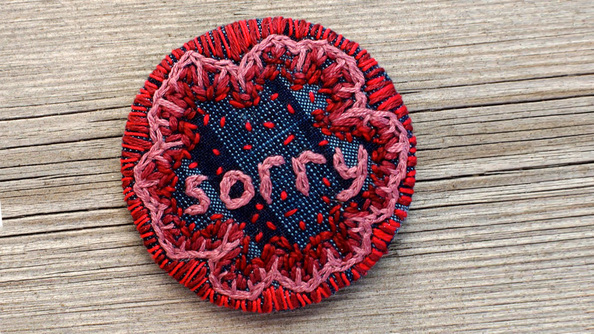LEADERSHIP
Sorry, Not Sorry - Why Women Need to Stop Apologising for Everything
BY GWEN MORAN
|
[Image: Flickr user butupa]
|
|
THE VIDEO MIGHT BE SELLING SHAMPOO, BUT ITS MESSAGE HITS CLOSE TO HOME. WHY ARE WOMEN SAYING "SORRY" FOR EVERYTHING? It’s been called the “hardest word,” but some women seem to use the word “sorry” as everything from a way to interject their thoughts into a conversation to a way of prefacing any request for help. Yesterday, Pantene even released a video about how often women apologize in everyday situations. The video is part of the company's #shinestrong campaign which is part of Pantene's Shine Strong Fund in partnership with the American Association of University Women. Apologizing unnecessarily puts women in a subservient position and makes people lose respect for them, says executive coach and radio host Bonnie Marcus. Sylvia Ann Hewlett, founder of the Manhattan-based think tank, Center for Talent Innovationand author of Executive Presence: The Missing Link Between Talent and Success, says using “sorry” frequently undermines our gravitas and makes them appear unfit for leadership.
It’s not like women don’t know it’s a bad habit. So, why do they do it? Business consultant Kathryn D. Cramer, author of Lead Positive: What Highly Effective Leaders See, Say, and Do, says women are socialized from an early age to focus on relationships and nurturing. Any sign of strength can be off-putting, so they’re conditioned to soften communication that can be construed as assertive or aggressive. Apologizing before speaking--or in any situation where women must show strength or where there is potential for conflict--is one way of doing so. Hewlett adds that workplace culture contributes to its use, too. In many cases, strong women need to find ways to temper their personalities or risk being called “rude,” “abrasive,” or even risk their jobs if they don’t find ways to soften others’ perception, she says. But saying “sorry” too often can be more career-killing than being disliked. So, it’s time to purge the word unless you really have something to be sorry about. TRACKING UNNEEDED APOLOGIES. Marcus suggests keeping a log of when you "sorry," what the situation was, and how you felt. Sometimes, “sorry” is just a verbal tic, but some usage patterns may indicate a situation or person who makes you feel insecure, she says. Being aware of those triggers and how they influence your language can help you be more vigilant in “changing your communication so you’re coming from a position of strength and equality,” she says. Trusted friends can help you break the habit by quietly letting you know when you’re using “sorry” inappropriately, Cramer says. Knowing that you’re under another’s watchful eye is also going to make you more aware of your speech, she says. FIND ANOTHER PHRASE. Sometimes, saying “sorry” is easier than thinking about the word you really want to say, or becomes a way of softening your words or opinion before they’re even out of your mouth, Cramer says. If either is the case, be more careful to choose the word or phrase you really mean to say. “Start your statement with, ‘Let me say this…’ or some other word or phrase that reflects your meaning better than saying ‘sorry,’” she says. EMBRACE SILENCE. Sometimes, instead of saying “sorry,” it’s best to not say anything at all. Hewlett encourages women to embrace the power of silence. For her book, she interviewed Sallie Krawcheck, who lead the wealth management divisions of both Bank of America and Citi. Krawcheck buffered important statements with silence in order to give them more weight. “She told me that, as a southern woman, she filled up silence with words because that’s how you make people comfortable--with chitter chatter--which diminished her voice. Using silence deliberately makes people uncomfortable, but not in an aggressive way,” she says. AUTHOR
GWEN MORAN → Gwen Moran writes about business, money and assorted other topics for leading publications and web sites. |
|
|
The
Psychodynamic Coaching & Consultancy.__ |
SITE MAP
|
Get in touch
|


